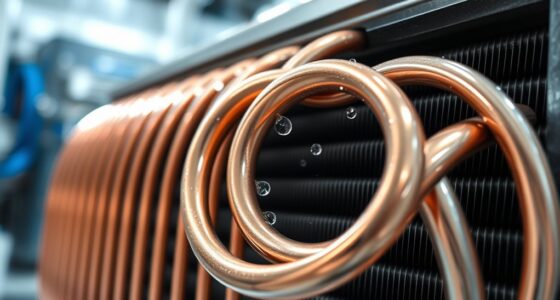We’re exploring the realm of heat pumps and their influence on environmental sustainability. Acting as a beacon towards eco-friendlier options, heat pumps provide a sustainable alternative for heating and cooling our living spaces.
In this article, we’ll explore the basics of heat pump technology, examine the environmental footprint they leave behind, and discuss sustainable solutions to minimize their impact.
Join us as we navigate the fascinating world of heat pumps and discover how they can serve both us and the planet.
Key Takeaways
- Heat pumps are highly efficient systems for heating and cooling, transferring heat from air, ground, or water sources.
- Heat pumps are more environmentally friendly than traditional heating systems, producing fewer carbon emissions and reducing greenhouse gases.
- Proper maintenance and choosing energy-efficient models can minimize the environmental footprint of heat pumps.
- Evaluating alternative renewable energy sources, integrating solar panels, and combining with energy storage systems can mitigate the environmental impact of heat pumps.
The Basics of Heat Pump Technology
Our understanding of heat pump technology’s basic principles is essential to grasp its environmental impact.

Heat pumps are highly efficient systems that can be used for both heating and cooling purposes. One of the main advantages of heat pumps is their energy efficiency. Unlike traditional heating systems that rely on burning fossil fuels, heat pumps transfer heat from the air, ground, or water sources, making them more environmentally friendly.
Additionally, heat pumps can provide both heating and cooling, eliminating the need for separate systems. However, there are also some disadvantages to consider. Heat pumps may have a higher upfront cost compared to traditional systems, and their performance can be affected by extreme temperatures.
Furthermore, there are different types of heat pump systems, including air source, ground source, and water source heat pumps, each with their own set of advantages and disadvantages. Understanding these basics is crucial in assessing the environmental impact of heat pump technology.
Understanding the Environmental Impact of Heat Pumps
Understanding the environmental impact of heat pumps involves evaluating their energy efficiency and emissions. Here are three important factors to consider:

-
Energy Efficiency: Heat pumps are known for their high energy efficiency. They transfer heat from the air or ground to heat or cool a space, using significantly less electricity compared to traditional heating and cooling systems. This results in lower energy consumption and reduced carbon emissions.
-
Carbon Emissions: Heat pumps produce fewer carbon emissions compared to conventional heating methods, such as gas or oil furnaces. By utilizing renewable energy sources like the air or ground, heat pumps help reduce greenhouse gas emissions and combat climate change.
-
Lifecycle Analysis: It’s important to consider the overall environmental impact of heat pumps throughout their entire lifecycle. This includes the manufacturing process, installation, operation, and eventual disposal. By choosing energy-efficient models and properly maintaining them, the environmental footprint of heat pumps can be minimized.
Examining the Refrigeration Cycle in Heat Pumps
To fully understand the environmental impact of heat pumps, we must examine the refrigeration cycle and its role in the overall operation of these systems.

The refrigeration cycle is the heart of a heat pump, as it’s responsible for transferring heat from one location to another. This cycle consists of four main components: the evaporator, compressor, condenser, and expansion valve.
The evaporator absorbs heat from the source, such as the ground or air, and transfers it to the refrigerant.
The compressor then increases the pressure and temperature of the refrigerant, which is then condensed in the condenser, releasing heat.
Finally, the expansion valve lowers the pressure of the refrigerant, allowing it to absorb heat again in the evaporator.

Regular maintenance is necessary to ensure the efficiency and longevity of the refrigeration cycle, as well as to prevent any potential leaks or malfunctions.
Efficiency improvements in heat pump technology have led to increased energy savings and reduced environmental impact.
Factors Affecting the Environmental Footprint of Heat Pumps
One of the key factors affecting the environmental footprint of heat pumps is the source of electricity used to power them. Here are three factors that influence the environmental impact of heat pumps:
-
Energy Efficiency:
Heat pumps are known for their high energy efficiency. When comparing different heat pump models, it’s important to consider their Coefficient of Performance (COP). A higher COP indicates better energy efficiency and lower carbon emissions.
-
Carbon Emissions:
The carbon emissions associated with heat pumps depend on the source of electricity used. If the electricity comes from renewable sources like solar or wind, the carbon emissions will be significantly lower compared to electricity generated from fossil fuels. -
System Design and Installation:
Proper system design and installation play a crucial role in minimizing the environmental impact of heat pumps. Factors such as the size, insulation, and distribution system of the heat pump should be considered to optimize energy efficiency and reduce carbon emissions.
Sustainable Solutions for Heat Pump Environmental Impact
How can we mitigate the environmental impact of heat pumps while still maintaining their efficiency?
One solution is evaluating alternative refrigerants for heat pumps. Traditional refrigerants, such as hydrofluorocarbons (HFCs), have high global warming potentials. However, new refrigerants, such as hydrofluoroolefins (HFOs) and natural refrigerants like CO2 and ammonia, have lower global warming potentials and can significantly reduce the environmental impact of heat pumps.

Another sustainable solution is incorporating renewable energy sources into heat pump systems. By using renewable energy sources like solar or wind power to generate electricity for heat pumps, we can reduce greenhouse gas emissions and reliance on fossil fuels. This not only reduces the environmental impact of heat pumps but also helps to create a more sustainable and clean energy system.
Frequently Asked Questions
Are Heat Pumps Suitable for All Types of Buildings and Climates?
Heat pumps are suitable for a variety of buildings and climates due to their versatility and efficiency. They can provide both heating and cooling, making them a great option for all types of spaces.
What Are the Main Differences Between Air Source and Ground Source Heat Pumps in Terms of Their Environmental Impact?
When comparing the environmental impact of air source and ground source heat pumps, we find that both options offer renewable energy integration. However, ground source heat pumps tend to have a lower carbon footprint due to their higher efficiency and lower reliance on external air temperatures.
Can Heat Pumps Be Used in Conjunction With Renewable Energy Sources to Further Reduce Their Environmental Footprint?
Yes, heat pumps can be used in conjunction with renewable energy sources to further reduce their environmental footprint. This integration allows for energy savings and cost effectiveness, making them a sustainable heating and cooling solution.

How Do the Energy Efficiency Ratings of Heat Pumps Compare to Other Heating and Cooling Systems?
When comparing energy efficiency, heat pumps typically outperform traditional HVAC systems. Adopting heat pumps can significantly reduce energy consumption and lower utility bills. Government incentives play a crucial role in promoting their usage.
What Are the Potential Long-Term Environmental Benefits of Widespread Adoption of Heat Pumps?
The widespread adoption of heat pumps has the potential to bring long-term environmental benefits. They can reduce greenhouse gas emissions, decrease reliance on fossil fuels, and improve energy efficiency. However, there may also be potential challenges and economic implications to consider.
Conclusion
In conclusion, heat pumps are hailed as environmentally friendly solutions for heating and cooling. However, it’s ironic that these devices, which rely on refrigerants with high global warming potential, contribute to climate change.
While efforts are being made to reduce their environmental footprint, it’s crucial to consider other sustainable alternatives as well.

Understanding the complexities of heat pump technology can help us make informed decisions to minimize our impact on the environment.









